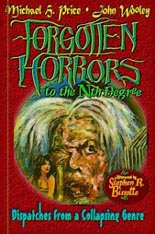
 Of the three collaborative volumes between Michael S. Price and John Wooley in the ongoing Forgotten Horrors series I’ve read thus far, Forgotten Horrors to the Nth Degree: Dispatches from a Collapsing Genre is the best.
Of the three collaborative volumes between Michael S. Price and John Wooley in the ongoing Forgotten Horrors series I’ve read thus far, Forgotten Horrors to the Nth Degree: Dispatches from a Collapsing Genre is the best.
It speaks directly to the film geek in me, saying, “Hey, read me, film geek.” It also is different from the others — Volume 6 just came out last month — in that instead of being a collection of reviews, it is a collection of columns that operate as both reviews and interviews. The contents are culled largely from the authors’ long-running, now-defunct, eponymous column in Fangoria magazine.
Roughly 40 films are examined in depth in such a manner, with Price-Wooley incorporating their opinions with the insights of at least one direct participant from the flick in question, no matter which side of the camera. The names include — but are by no means limited to — Donald Pleasence (Raw Meat), Rudy Ray Moore (Petey Wheatstraw), Ivan Reitman (Cannibal Girls), Chuck Connors (Tourist Trap), Marilyn Chambers (Rabid) and Jamie Lee Curtis (Terror Train).
Just about everyone seems thrilled to discuss the particular, peculiar CV entry in question, save for two examples: The Entity‘s Barbara Hershey and Barn of the Naked Dead director Alan Rudolph, who refuses to admit association with it, despite plenty of evidence to the contrary.
Purposely, the pieces fall within the horror genre’s heyday, said by the authors to begin with H.G. Lewis’ invention of the gore picture with 1963’s Blood Feast and end with the shot-on-video Blood Cult, which changed everything in 1985 by being the first feature film expressly made for the home-video market.
Emblematic of its name, Nth Degree, the 304-page trade paperback ventures off its own beaten path to include plenty of extras, in the form of extended pieces on David F. Friedman, Larry Buchanan, Leo Fong and others. Comics great Stephen R. Bissette provides an “afterword” of capsule reviews of Vermont-set horror films, and hell, there’s even a multipage comic-book story that opens the volume.
My only complaints with the book are minor: an overuse of antiquated phrases such as “et. seq.” and an egregious use of some godawful Adobe Photoshop filter that noticeably mars so many of the photographs (thankfully, poster art escapes this mistreatment). Otherwise, Nth Degree is an infectious trip for the psychotronic-inclined; seat belts optional. —Rod Lott
